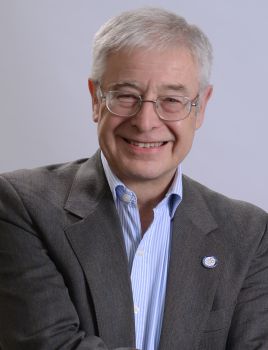News article
“I knew Sussex had just what the country needed”
By: Jacqui Bealing
Last updated: Friday, 17 January 2025

Professor L Alan Winters
L Alan Winters CB, Emeritus Professor of Economics at the University of Sussex, will be conferred Honorary Doctor of Laws at Winter Graduation on 23 January 2025.
When the result of the Brexit referendum was announced in June 2016, Professor Alan Winters, felt shock – and then despair.
As an economist and an expert in international trade policies, he knew the UK would be pitched into turmoil by leaving the European Union because the Government had nothing prepared.
“But then I realised that I understood more about these issues than possibly anyone else in the UK,” he says. “And I knew that, with my colleagues at Sussex, we had just what the country needed.”
Within days he had mobilised fellow academics and been assured funding to found the UK Trade Policy Observatory (UKTPO), a group who would prove to be invaluable in providing advice, analysis and clear explanations to ministers, policymakers, journalists, trade organisations and anyone else puzzling over what the UK needed to do to navigate its way with an independent trade policy.
“You would not believe the level of ignorance out there,” he says. “For 18 months, we were the go-to specialists.
“I think we can claim some credit for how quiet the Government went about the economic benefits of Brexit. That’s why they then focused the argument on ‘restoring our sovereignty’.”
Sadly, he feels the politics were “mishandled” and that, despite UKTPO providing robust analysis, the final trade agreement left the UK with “very little”.
A serious side effect of Brexit, he points out, is that it diverted attention away from other urgent economic issues.
“The long-term problems we have now are partly because, during that period, no one addressed them. No one in Government had the energy. So hospitals are falling down, productivity growth is negligible, et cetera. I think that this neglect may turn out to be even more damaging then the direct costs.”
Winters, who first came to Sussex in 1999, has spent more than 50 years immersed in economics – particularly economic policy. “Economists are interested in society," he says. "If you can make improvements in economic policies, they can be worth billions [to those nations].”
During his career, he has published over 250 articles and chapters, and 30 books in areas such as regional trading arrangements, trade and poverty, non-tariff barriers, international migration and agricultural protection.
“I am particularly proud of the work I did and led on migration,” he says. “I did one of the very first quantifications of the global economic benefits of international migration and gathered enough data to show there were potentially much greater gains from partially liberalising migration than from international trade.”
Following the creation of UKTPO, Winters then led the successful application to the ESRC for funding for the interdisciplinary Centre for Inclusive Trade Policy, in which Sussex is the lead institution and which is the first ESRC centre to be funded specifically in the area of international trade.
Winters began his career as an academic and came to Sussex in 1999, following a stint with the World Bank. “I was nearly 50 and I wanted to get back into academia,” he says. “Sussex economists did the two things I was interested in - development and international trade - so it was a very good fit.”
His is, however, grateful that when an opportunity arose to return to the World Bank for three years as Director of the Development Research Group in 2004, the then Vice-Chancellor of Sussex, Alasdair Smith, agreed he could do it – as long as he returned. Winters kept to his word.
Similarly, he accepted the post of Chief Economist at the Department for International Development (DFID) from 2008-2011, returning to Sussex afterwards.
Although he was nearing retirement in 2016, the surge in interest in international trade following Brexit has kept Winters very much in demand and working well into his 70s.
Among the many who have benefited from his knowledge and advice are various UK government departments, the Commonwealth Secretariat, the European Commission, the European Parliament, the United Nations Conference on Trade and Development and the World Trade Organization – among others.
He has been honoured for his work in Government, being made a Companion of the Order of the Bath in 2012.
But teaching Sussex postgraduates he says has been one of the most rewarding aspects of his career.
“I loved teaching research students – particularly in development, in which Sussex attracts very good research students, and we are now building back our reputation in trade.
“I have also always had a penchant for interdisciplinary research, which is another great Sussex strength. I’ve been very happy here.”